Little International Uranium Film Festival (IUFF) in Düsseldorf with the support of Sayonara-Genpatsu Düsseldorf on September 11th, 2021 from 12.30 pm to 6.00 pm in the Cinema Bambi.
Topic: “Sinners and Victims”
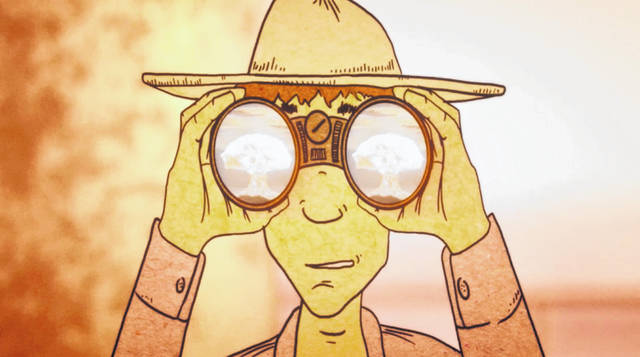 “Day of the Western Sunrise", the first film will serve as a good introduction to a familiar topic for many people although new insights concerning the test bombing after nine years since Nagasaki and its aftermaths will probably shock a lot in the audience. The film shows a tragic, serious story in a light manner with the help of animation and the mentality of the men interviewed. They express themselves very indirectly in a typical Japanese way that makes the observer even sadder.
“Day of the Western Sunrise", the first film will serve as a good introduction to a familiar topic for many people although new insights concerning the test bombing after nine years since Nagasaki and its aftermaths will probably shock a lot in the audience. The film shows a tragic, serious story in a light manner with the help of animation and the mentality of the men interviewed. They express themselves very indirectly in a typical Japanese way that makes the observer even sadder.
The film is easy for everybody to understand. For beginners, a very informative film depicting the fishers as victims not only of the US, but also of Japan. But for those familiar with the present nuke-policies in Japan, it will remind them of the situation after the Fukushima catastrophe and leave them with the frustration of the never-ending story of the negligence of its politicians and the hostility of its citizens.
The impression left at the end of the film might be the accusation towards the US for using the bomb in the first place, and also continuing to develop it under the pretext of peaceful use. (Eisenhower´s speech “Atoms for Peace” was in December 1953, three months before the ship Lucky Dragon No.5 encountered the US nuclear test in the Pacific on the so-called “Bikini-Day”.) However, one of the fishermen that survived states that Japan had also carried out the war and brought sorrow to a lot of people. But at the end, when one fisherman was asked, if there were any positive outcomes to the incident leading the world in a better direction, he answered he did not know. He would like to ask us if we knew… So a big “?” was left to us to think about.
As Japan would have probably used the bomb, if it had it at the time, and as it still restarting its nukes even after Fukushima and still neglecting its victims in Fukushima, the question is whether or not, we, Japanese, are sinners and victims at the same time…
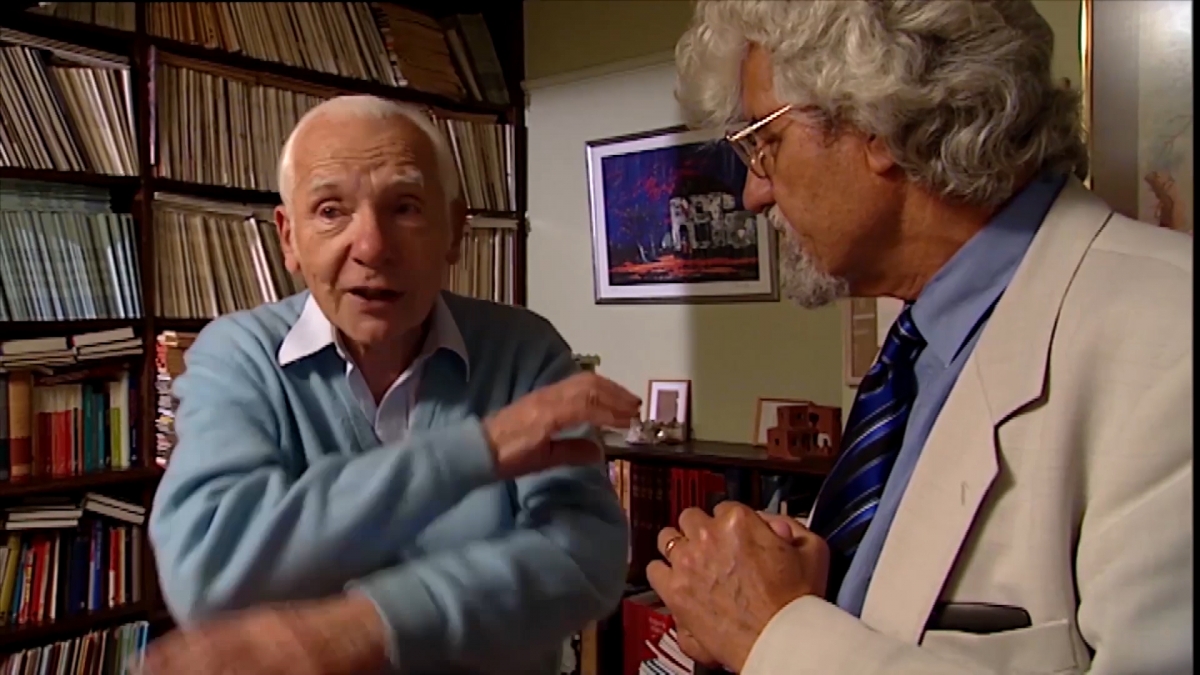 "Vom Sinn des Ganzen", the second film, as if attempting to answer the last fisherman´s question, reveals the reactions of those physicists who were directly or indirectly involved in developing the bomb. The audience of this film will need some previous knowledge of the development of the atomic bomb research before the war as well as the intellectual discussion of the 70s perhaps in order to understand the whole story. Among the researchers, there were different attitudes to thinking whether they thought themselves responsible for the deaths of the people in Hiroshima and Nagasaki. There were generally speaking three different attitudes: The first group repented their deed and joined the anti-nuke movements like Rotblat; The second group felt responsible, but thought that they could make it better by contributing their future research limiting it to technique for the sake of peaceful use of energy like Heisenberg. But there was the third group that was still convinced that nuclear force will be needed to protect the free world and defended its use and further development of nuclear bombs like Teller.
"Vom Sinn des Ganzen", the second film, as if attempting to answer the last fisherman´s question, reveals the reactions of those physicists who were directly or indirectly involved in developing the bomb. The audience of this film will need some previous knowledge of the development of the atomic bomb research before the war as well as the intellectual discussion of the 70s perhaps in order to understand the whole story. Among the researchers, there were different attitudes to thinking whether they thought themselves responsible for the deaths of the people in Hiroshima and Nagasaki. There were generally speaking three different attitudes: The first group repented their deed and joined the anti-nuke movements like Rotblat; The second group felt responsible, but thought that they could make it better by contributing their future research limiting it to technique for the sake of peaceful use of energy like Heisenberg. But there was the third group that was still convinced that nuclear force will be needed to protect the free world and defended its use and further development of nuclear bombs like Teller.
The film is mainly centered on Hans-Peter Dürr, whose standpoint was close to Rotblat´s. He was involved in the theoretical development of atom energy before the war, but turned critical towards it after the bombs in Japan. He did join the peace movement, but his engagement was more centered on epistemological and sociopolitical concepts. One even gets an esoteric impression of his theory of nonexistence of matters, frozen light, reality as image, ”All-Verbundenheit” (all-connectedness), “Geist” (spirit) etc. However, he started advocating the importance of ecology and sustainable energy already in the beginning of the 80s and can be seen as the pioneer of today´s green movement.
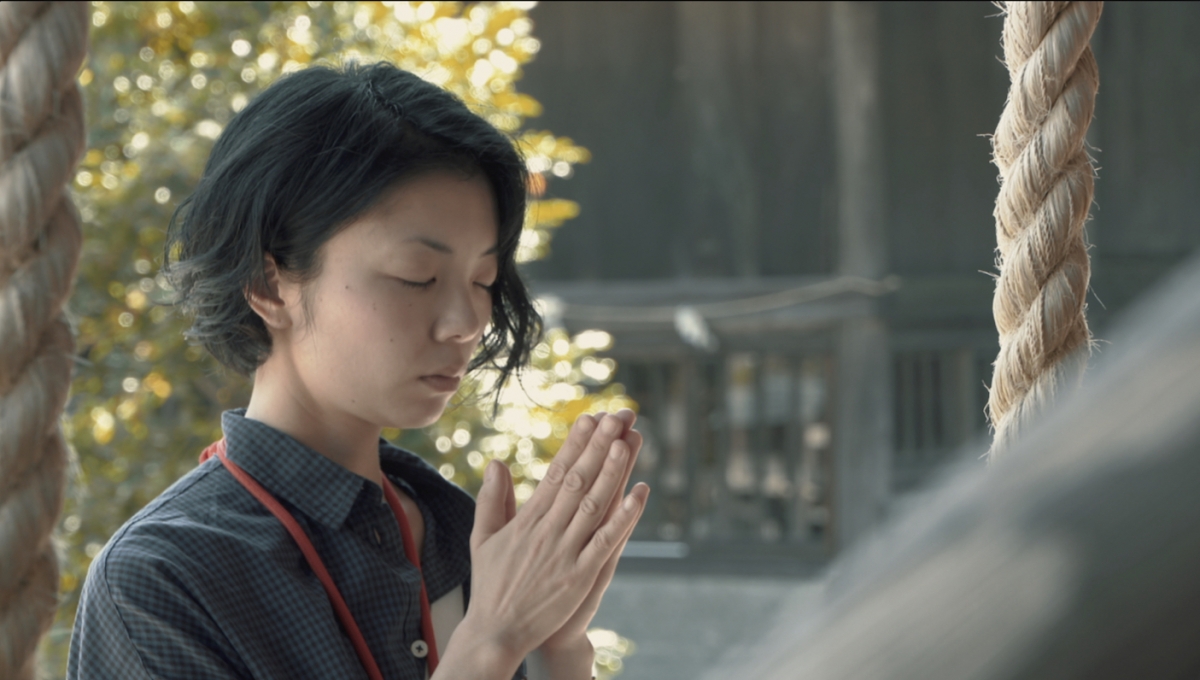 “The Invisible Island", the third film depicts those Japanese and their “spirits” still living in the contaminated districts of Fukushima years after the meltdowns in 2011. “They” had promised it would not happen. “They” had promised it would be safe to live there!
“The Invisible Island", the third film depicts those Japanese and their “spirits” still living in the contaminated districts of Fukushima years after the meltdowns in 2011. “They” had promised it would not happen. “They” had promised it would be safe to live there!
Some seven groups of people are interviewed why they are still there. Some answers: Fukushima is his home town; It is their destiny; He cannot accept the reality as yet and lives in a parallel world leading to death; He was sceptical of the benefits given to them by TEPCO before the accident (so a sinner in a sense), but now the victim; She is still under shock and has turned to religion for help; They were workers at TEPCO and have decided to stay knowing it is a dead city; They remained to cook food for the workers there, then 250, now 50; They came to work at TEPCO after the catastrophe because of employment – the more dangerous, the better the pay, believing that short working hours will keep them alive, if they are careful – they try to forget their daily lives by horse-racing, drinking and Karaoke in their free time…
The film starts out with a poem by Arseny Tarkovsky: “And this I dreamt…” accompanied by music composed by the famous Ryuichi Sakamoto. But the reality turns out to be a nightmare, desolation, hopelessness…There is no meaning in anything.
My thoughts at the end? Those who are engaged in the anti-atom movement seem to have a certain feeling of “guilt” in their hearts. Of course, in a way, we are all “victims”, too. I think when we acknowledge the fact that we are somehow both sinners and victims of this atom age, perhaps there are chances of changing nuclear policy.
Makiko Hamaguchi-Klenner, Prof. for East Asian Politics and Curator of the Uranium Film Festival in Düsseldorf
Uranium Film Festival in Düsseldorf Program, September 11
12.30pm - 1.45pm
DAY OF THE WESTERN SUNRISE 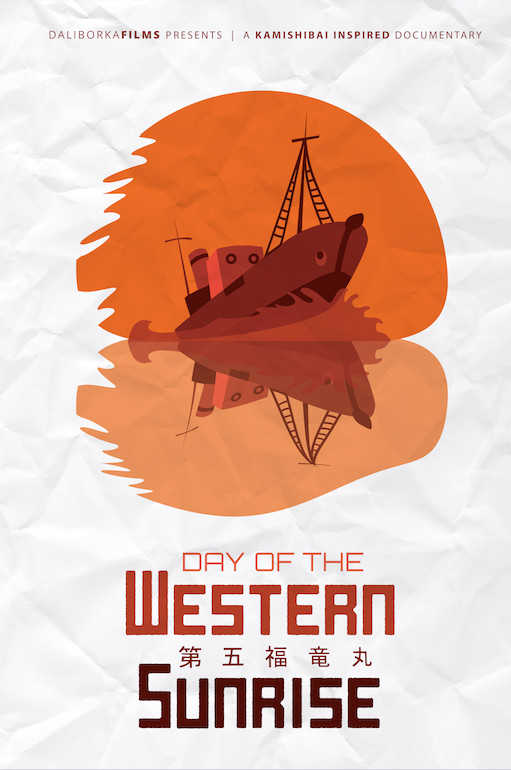 - United States, 2018, Director Keith Reimink, Animation Documentary, 75 min, Japanese with English subtitles - Cold war in the 1950ies. The US testing nuclear bombs in the Pacific. 23 Japanese fishermen aboard the tuna trawler Daigo Fukuryu Maru (Lucky Dragon No. 5) accidentally encounter the detonation of Castle Bravo, an early hydrogen bomb test conducted by the US. All 23 men became sick from acute radiation poisoning and were quarantined for 15 months upon arrival back to Japan. In the hospital, they endured endless medical tests and scrutiny from Japanese and American doctors. They also watched their esteemed colleague, Aikichi Kuboyama, pass away from exposure. Having all received high doses of radiation, the surviving fishermen were forced to consider their own mortality. In June of 1955, the 22 fishermen were sent home only to discover their problems were far from over. Because of the ignorance surrounding 'hibakusha,' or ‚radiation-affected people,' the fishermen were ostracized from their communities. They lost friends and loved ones, were openly ridiculed, and eventually forced into hiding.
- United States, 2018, Director Keith Reimink, Animation Documentary, 75 min, Japanese with English subtitles - Cold war in the 1950ies. The US testing nuclear bombs in the Pacific. 23 Japanese fishermen aboard the tuna trawler Daigo Fukuryu Maru (Lucky Dragon No. 5) accidentally encounter the detonation of Castle Bravo, an early hydrogen bomb test conducted by the US. All 23 men became sick from acute radiation poisoning and were quarantined for 15 months upon arrival back to Japan. In the hospital, they endured endless medical tests and scrutiny from Japanese and American doctors. They also watched their esteemed colleague, Aikichi Kuboyama, pass away from exposure. Having all received high doses of radiation, the surviving fishermen were forced to consider their own mortality. In June of 1955, the 22 fishermen were sent home only to discover their problems were far from over. Because of the ignorance surrounding 'hibakusha,' or ‚radiation-affected people,' the fishermen were ostracized from their communities. They lost friends and loved ones, were openly ridiculed, and eventually forced into hiding.
'Day of the Western Sunrise' is an animated Japanese language documentary that follows three survivors from the Lucky Dragon. Now in their 80's, their story is a reminder that the human race has the ability to make decisions for both good and ill, and those decisions can affect generations. Filmmaker Keith Reimink graduated from New York University's Tisch School of the Arts with a BFA in Film and TV Production. His first documentary, the award-winning 'No Horizon Anymore,' chronicled a year he spent living and working at Amundsen-Scott South Pole Station. He writes: „It is the belief of the filmmakers that above the ideas of politics, religion, and financial gain, must be the ability to create a peaceful and thriving society. Operation Castle, consisting of six thermonuclear detonations over the course of five months, happened at a time when the focus of the world centered on strength, domination, and fear rather than unity and acceptance. The global impact of these thermonuclear tests is still felt today by the Marshallese who were displaced from their homes on Rongelap and Bikini and are unable to return, and by the Japanese citizens who look to international governments to release still classified documents.“ Trailer: vimeo.com/288756720
2.00 p.m. - 3.40 p.m.
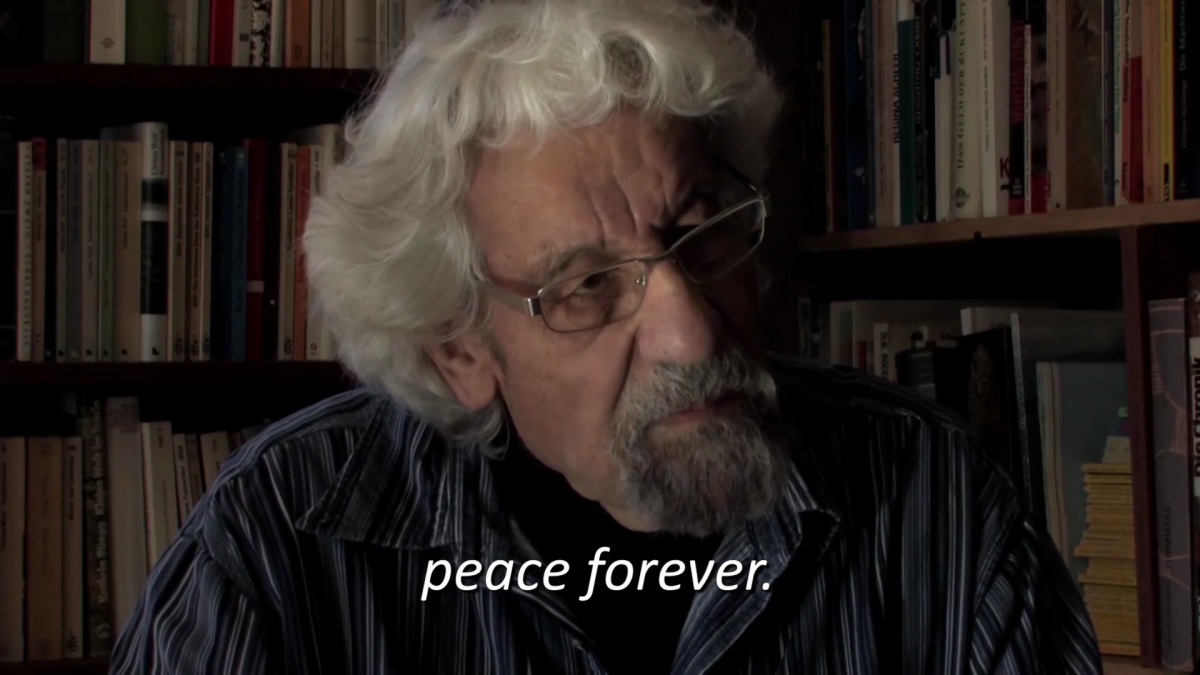 VOM SINN DES GANZEN (About the Meaning of Everything - The Network of Physicist Hans-Peter Dürr) - Germany, 2020, Director Claus Biegert, Production Biegertfilm, music by Zoro Babel, Documentary, 103 min, German with Japanese subtitles - Hans-Peter Dürr, as a physicist he followed the footsteps of the world re-nowned Werner Heisenberg. As a peace activist he was torn between his PhD supervisor Edward Teller and peace Nobel laureate Josef Rotblat, both of them involved in the Manhattan project during World War II. When it became obvious that Hitler would not built an atomic bomb (Wunderwaffe), Rotblat immediately resigned from Los Alamos, Teller stayed and became the "father of the hydrogen bomb". In the early 1950s, the young and naive Hans-Peter from Stuttgart, Germany, stepped into the bomb euphoria in Berkeley, California. It shaped his life. He became a role model for a scientist with responsibility.
VOM SINN DES GANZEN (About the Meaning of Everything - The Network of Physicist Hans-Peter Dürr) - Germany, 2020, Director Claus Biegert, Production Biegertfilm, music by Zoro Babel, Documentary, 103 min, German with Japanese subtitles - Hans-Peter Dürr, as a physicist he followed the footsteps of the world re-nowned Werner Heisenberg. As a peace activist he was torn between his PhD supervisor Edward Teller and peace Nobel laureate Josef Rotblat, both of them involved in the Manhattan project during World War II. When it became obvious that Hitler would not built an atomic bomb (Wunderwaffe), Rotblat immediately resigned from Los Alamos, Teller stayed and became the "father of the hydrogen bomb". In the early 1950s, the young and naive Hans-Peter from Stuttgart, Germany, stepped into the bomb euphoria in Berkeley, California. It shaped his life. He became a role model for a scientist with responsibility.
The film offers previously un-known material about encounters of Dürr with Teller and Rotblat. A film with Franz Alt, Angelika Claussen, Daniel Dahm, Sue Dürr, Giselle Full, Tiokasin Ghosthorse, Hartmut Grassl, Isabelle Krötsch, Rudolf zur Lippe, John D. Liu, Josef Rotblat, Heinrich Saller, Erhard Seiller, Rupert Sheldrake, Edward Teller, Ulrich Warnke, Andreas Weber, Konstantin Wecker, Ernst-Ulrich von Weizsäcker. Claus Biegert is a journalist, author, film-maker, radio reporter and human rights activist, based in Munich, Germany. He published numerous books on Native Americans and environmental issues. For many years he had his own radio program at the Bavarian Public Radio. In 1979/80 he collaborated with visual artist Rainer Wittenborn and many Cree hunters in the multi-media exhibition “James Bay Project – A River Drowned by Water”, which traveled – under the patronage of the Goethe Institute – the world for almost ten years. Among his films are “The Secret and the Sacred – Two Worlds at Los Alamos”(2001), “Winona LaDuke – Thunderbird Woman”(2003), “Leonard Peltier: I am the Indian Voice”(2013) and “Exit 16 – Onondaga Nation Territory”(2014). Biegert is the initiator of the World Uranium Hearing, 1992 in Salzburg, Austria, and the co-founder of the international Nuclear-Free Future Award, which started in 1998. https://www.biegert-film.de
4.00 p.m. - 5.30 p.m.
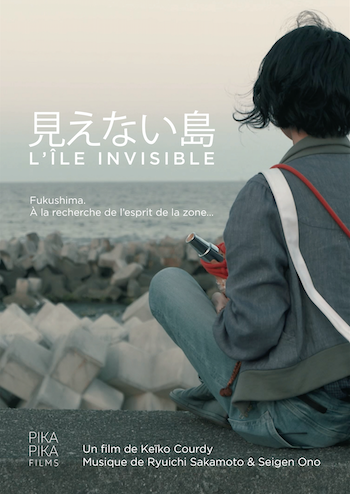 “THE INVISIBLE ISLAND (L'Ile Invisible / 見えない島) - France, 2021, Director Keïko Courdy, Producer PIKA PIKA FILMS, Music by Ryuichi Sakamoto, Support of KissKissBankers, Documentary, 87 min, Japanese with English subtitles - Waves crash eternally on the shore of Fukushima Daiichi Nuclear Power Plant. Next to a white facility for radioactive waste burning, black bags of contaminated soil pile up while a family looks for traces of their house. The film relates the stories of people who survived the tsunami and were forced to leave their home, people who came back in the darkest times, and people who came to work from far away, decontamination workers of Fukushima Daiichi. In the zone, invisible traumas are everywhere. There is no life without risk but what risk are we ready to take? In Japan, everyone wishes to forget and go forward, but the traces can not be erased that easily.
“THE INVISIBLE ISLAND (L'Ile Invisible / 見えない島) - France, 2021, Director Keïko Courdy, Producer PIKA PIKA FILMS, Music by Ryuichi Sakamoto, Support of KissKissBankers, Documentary, 87 min, Japanese with English subtitles - Waves crash eternally on the shore of Fukushima Daiichi Nuclear Power Plant. Next to a white facility for radioactive waste burning, black bags of contaminated soil pile up while a family looks for traces of their house. The film relates the stories of people who survived the tsunami and were forced to leave their home, people who came back in the darkest times, and people who came to work from far away, decontamination workers of Fukushima Daiichi. In the zone, invisible traumas are everywhere. There is no life without risk but what risk are we ready to take? In Japan, everyone wishes to forget and go forward, but the traces can not be erased that easily.
The film is the story of resilience, failed technology, and the transformation of a territory. Keïko Courdy went filming in the zone every year since 2011, developing a trust relationship with local people and nuclear workers. She filmed rare testimonies of nuclear workers, revealing the hidden life of this parallel world. Trailer: https://vimeo.com/388306408 / https://en.pikapikafilms.com
Festival curator
Prof. Emeritus Makiko Hamaguchi-Klenner" (Professor for East Asian Politics)
Festival support
Sayonara Genpatsu Dusseldorf
Admission 1 film 7 euros / 2 films 10 euros / 3 films 15 euros.
DONATE with PayPal
Contact:
International Uranium Film Festival
Rua Monte Alegre 356 / 301
Rio de Janeiro/RJ
CEP 20.240-194
info@uraniumfilmfestival.org







